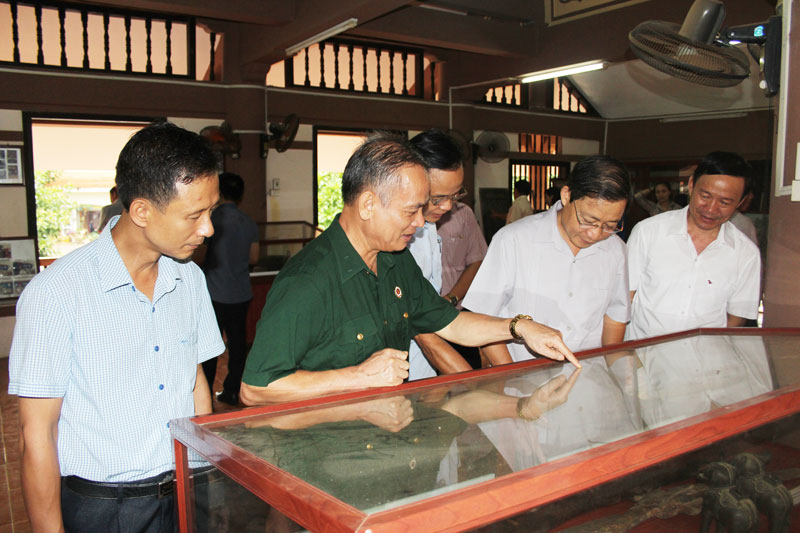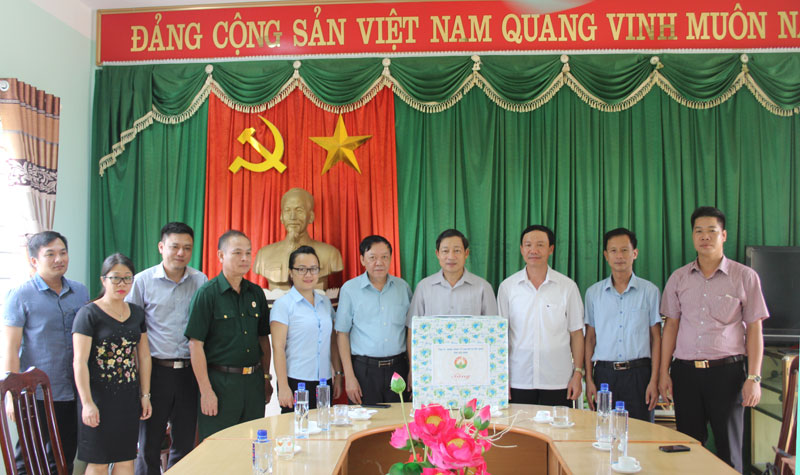
(HBO) – A delegation of Hoa Binh provincial authorities led by Vice Chairman of the provincial People’s Committee Bui Van Cuu has visited and presented gifts to officials and residents in the former Muong Khoi revolutionary base in An Nghia commune, Lac Son district, ahead of the 72nd National Day (September 2, 1945).
Vice Chairman of the provincial People’s Committee Bui
Van Cuu visits an exhibition hall where historical relics of the Muong Khoi
relic site are on show.
Vice Chairman of the provincial People’s
Committee Bui Van Cuu presents gifts to officials and people of An Nghia
commune, Lac Son district.
After offering incense at the war memorial and
visiting the exhibition hall of the Muong Khoi relic site, the delegation had a
meeting with local officials and people.
In the past, the Muong Khoi revolutionary base
covered Hoai An and Hieu Nghia communes and was a gateway to the northwestern
region. In July 1945, the Party Committee of the northern region opened a
training course for military officers in
Lothamlet to prepare for the General Uprising one month later. In August that
year, An Nghia people waged a fight against the French colonialists and the
feudal regime and joined forces from other revolutionary bases to seize power.
At the meeting, Vice Chairman Cuu hailed the
outcomes and achievements that the administration and people in An Nghia
commune have obtained during economic development, poverty elimination and
defence-security maintenance.
He voiced his hope that local officials and
residents will uphold the revolutionary tradition to fulfill the set targets in
the national target programme on building new-style rural areas. He urged An
Nghia commune to capitalize on the local advantages in terms of natural
conditions and tourism potential of Muong Khoi relic in the time ahead.
The Standing Board of the Hoa Binh provincial Party Committee has agreed in principle on a proposal by the Standing Board of the Party Committee of Hoa Binh city to gather feedback on the city’s 1:2000 zoning plan, which forms part of its broader urban development strategy.
Hoa Binh province has made notable progress in public administration reform and digital government development, with the satisfaction index among citizens and businesses reaching over 84%, according to recent government evaluations.
Thanks to great efforts by local authorities in recent times, the governance and public administration performance of Mai Chau district has been significantly improved.
In the afternoon of June 6, the Party Committee, the People's Council, the People's Committee and the Fatherland Front of Lac Son district solemnly held a meeting to celebrate the 139th anniversary of the district's founding (1886–2025) and the 79th anniversary of the establishment of the district's Party Committee (1946–2025). There was the attendance of Mr. Bui Van Thang, the Vice Chairman of the Provincial People's Council; Mr. Quach Tat Liem, the Vice Chairman of the Provincial People's Committee; Ms. Dang Bich Ngoc, the Deputy Head of the National Assembly Delegation of the province; as well as the former leaders of the province and district through various periods, who are the natives of the district.
Implementing the Politburo’s Resolution No. 57-NQ/TW on breakthroughs in science – technology, innovation, and digital transformation is a golden opportunity for the northern mountainous province of Hoa Binh to renew growth model, improve competitive edge and shorten digital gap.
Resolution 57-NQ/TW, issued by the Politburo on December 22, 2024, identifies sci-tech, innovation, and digital transformation as strategic breakthroughs to build a developed and prosperous nation. In Hoa Binh province, this spirit is not just a slogan, it’s being put into action through concrete initiatives that form a "new development triangle”: digital citizenship, digital economy, and digital administration.




